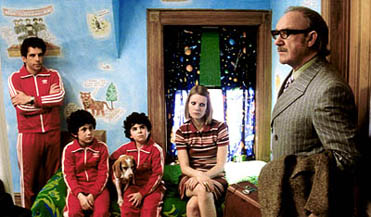Are You With Us?: The Royal Tenenbaums
By Shalimar Sahota
December 17, 2009
Directed by – Wes Anderson
Starring – Danny Glover (Henry Sherman), Gene Hackman (Royal Tenenbaum), Anjelica Huston (Etheline Tenenbaum), Bill Murray (Raleigh St. Clair), Gwyneth Paltrow (Margot Tenenbaum), Ben Stiller (Chas Tenenbaum), Luke Wilson (Richie Tenenbaum), Owen Wilson (Eli Cash)
Length – 105 minutes
Cert 15 / R
The Royal Tenenbaums came across to me as a tragi-comedy, one that's more tragi and less comedy.
Royal Tenenbaum (Hackman) and his wife Etheline (Huston) are separating. She has asked Royal to leave so she can raise their three children on her own. "Maybe I wasn't as true to her as I could have been," is Royal's response when asked why he's leaving. Their children were considered geniuses. Chas (Stiller) became a real estate trader in his teens; Richie (Luke Wilson) became an exceptional tennis player; and Margot (Paltrow) became a playwright, receiving a grant of $50,000 for her ninth grade play. Twenty-two years later, Royal has been living in a hotel since the separation. Chas is now widowed, looking after his two sons. Richie is living on a ship and has dangerously deep feelings for Margot (she was adopted, so they're not blood relations). Margot is now married to famed neurologist Raleigh St Clair (Murray), hasn't written a play for seven years and is secretly seeing her former next-door neighbour, Eli Cash (Owen Wilson). They are all brought back together after it appears that their father is dying of cancer.
Written by director Wes Anderson and his usual collaborator Owen Wilson, they both received an Oscar nomination for the script. Wilson revealed that neither he nor Anderson are actually any good at writing plots, saying "We don't begin with any fixed ideas. We just get hooked on these odd funny characters, coming up with funny stuff, stuff to make each other laugh." It's to their credit that they're able to squeeze a film out of a rather vacant story idea.
The introduction expertly establishes how the Tenenbaum children found their calling at such a young age. It flies through to get the essentials across, yet feels like there's a whole movie in the first ten minutes that Anderson could expand and explore if he were willing to. It doesn't take long to see that two decades on and the trio of Tenenbaum siblings haven't really developed much as adults. They're still locked up in the past, struggling to move on. They've also lost their status as prodigies. The introduction has the three Tenenbaum children holding a press conference. In their later years there is no such thing for either one of them.
Anderson has painstakingly crafted every scene with a deliberate purpose. There are things that may not be apparent straight away (or at least not upon first viewing), but scenes lasting even mere seconds are loaded with detail, revealing more to us about the characters when they're not on screen, be it the posters of Margot's plays, the stack of board games, or the pile of videos in Eli Cash's house.
Also coming into this is the whole borderline '70s, retro look, which also reinforces how the characters are still stuck in the past. Margot still has her fur coat, Richie is forever wearing a headband, but most notably Chas and his children are constantly wearing red Adidas tracksuits. Interestingly, Adidas didn't pay to have their brand featured in the film. Even Fila and Lacoste appear, but it was just Anderson's decision that the characters use these brands, not a financial one (Anderson later designed fictional one of a kind blue trainers for The Life Aquatic with Steve Zissou, which prompted numerous calls to the company from fans trying to obtain a pair). The film has even become a fashion inspiration with some online sites advising how to get the ‘Tenenbaum-look'.
While I enjoyed the numerous quirks, idiosyncrasies and overall dysfunctional-ness, it was rarely funny. I laughed only twice. A distinctive black comedy, I wasn't waiting for it to humor me, though I was content with the story presented, one that evokes a wistful tone. It reaches a seriously shocking high during one character's attempted suicide. It's a frightening moment thatworks because it feels so out of place with everything seen up to that point.
Made on a budget of $21million, it opened on limited release in December 2001. Starting out on just five screens it kept expanding, reaching its peak in week four of release, ranking #5 with a take of $8.5 million. The film ran for over 25 weeks and ended its run taking just over $52 million, with a worldwide total of $71 million, making it Anderson's most successful film to date. Like all of Anderson's films (bar The Darjeeling Limited) it became a part of The Criterion Collection of "important classic and contemporary films." Lately, Anderson has been receiving the best reviews of his career with his adaptation of Roald Dahl's Fantastic Mr. Fox, which admittedly plays like a children's story tailored towards adults.
The Royal Tenenbaums is admirably quirky, but it's the more melancholy moments that stick. What Anderson successfully conveys is the feeling of loss that comes from broken families, parents who have separated, divorced or left before their time. It might also explain why those from similar backgrounds tend to be big fans. It ultimately tries to teach us to make amends with those we love before it's too late.




